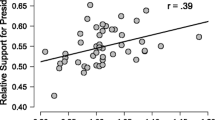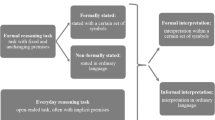Abstract
Language pragmatics is applied to analyse problem statements and instructions used in a few influential experimental tasks in the psychology of reasoning. This analysis aims to determine the interpretation of the task which the participant is likely to construct. It is applied to studies of deduction (where the interpretation of quantifiers and connectives is crucial) and to studies of inclusion judgment and probabilistic judgment. It is shown that the interpretation of the problem statements or even the representation of the task as a whole often turn out to differ from the experimenter's assumptions. This has serious consequences for the validity of these experimental results and therefore for the claims about human irrationality based on them.
Similar content being viewed by others
References
Agnoli, F. & De Zuani, E. (1990) Fraintendimenti nel ragionamento probabilistico e implicazioni educative,Età evolutiva, 35, pp. 15–25.
Anscombre, J.C. & Ducrot, O. (1983)L'argumentation dans la langue (Bruxelles, Mardaga).
Bar-Hillel, M. (1990) Back to base rates, in R.M. Hogarth (Ed.)Insights in Decision Making (Chicago, University of Chicago Press).
Begg, I. & Harris, G. (1982) On the interpretation of syllogisms,Journal of Verbal Learning and Verbal Behavior, 21, pp. 595–620
Brainerd, C.J. & Reyna, V.F. (1991) Inclusion fallacy: fuzzy trace theory and perceptual salience effects in cognitive development,Developmental Review, 10, pp. 365–403
Byrne, R.M.J. (1989) Suppressing valid inferences with conditionals,Cognition, 31, pp. 61–83
Chan, D. & Chua, F. (1994) Suppression of valid inferences: Syntactic views, mental models, and relative salience,Cognition, 53, pp. 217–238.
Cummins, D.D., Lubart, T., Alkinis, O. & Rist, R. (1991) Conditional reasoning and causation,Memory and Cognition, 19, pp. 274–282.
Casscells, W., Schoenberger, A. & Graboys, T.B. (1987) Interpretation by physicians of clinical laboratory results,New England Journal Of Medicine, 229, pp. 999–1001.
Ducrot, O. (1984)Le dire et le dit (Paris, Editions de Minuit).
Dulany, D.E. & Hilton, D.J. (1991) Conversational implicature, conscious representation, and the conjunction fallacy,Social Cognition, 9(1), pp. 85–110.
Fiedler, K. (1988) The dependence of the conjunction fallacy on subtle linguistic factors,Psychological Research, 50, pp. 123–129.
Gigerenzer, G. (1991) On cognitive illusion and rationality, in E. Eells & T. Maruszewski (Eds.)Reasoning and Rationality. Essays in honour of L. J. Cohen (Amsterdam: Rodopi).
Gigerenzer, G. (1995) Why the distinction between single-event probabilities and frequencies is important for psychology (and vice versa), in G. Wright & P. Ayton (Eds.)Subjective probability (Chichester, John Wiley & Sons).
Gigerenzer, G., Hell, W. & Blank, H. (1988) Presentation and content: the use of base rates as a continuous variable,Journal of Experimental Psychology: Human perceptions and Performance, 14(3), pp. 513–525.
Gigerenzer, G. & Hoffrage, U. (1995) How to improve bayesian reasoning without instruction: frequency formats,Psychological Review, 102, pp. 684–704.
Ginossar, Z. & Trope, Y. (1987) Problem solving in judgment under uncertainty,Journal of Personality and Social Psychology, 52, pp. 464–474.
Girotto, V. & Politzer, G. (1990) Conversational and world knowledge constraints on deductive reasoning, in J.P. Caverni, J.M. Fabre & M. Gonzales (Eds.)Cognitive biases (Amsterdam, North-Holland).
Goffman, E. (1974)Frame analysis (New York, Harper & Row).
Goffman, E. (1981)Forms of talk (Oxford, Basil Blackwell).
Grice, H.P. (1975) Logic and conversation, in P. Cole & J.L. Morgan (Eds.)Syntax and Semantics Vol. 3: Speech acts (New York, Academic Press).
Grice, P. (1989)Studies in the way of words (Cambridge, Harvard University Press).
Hertwig, R. & Gigerenzer, G. (1997) The “conjunction fallacy” revisited: how intelligent inferences look like reasoning errors,Mimeo.
Hilton, D.J. (1995) The social context of reasoning: Conversational inference and rational judgment,Psychological Bulletin, 118, pp. 248–271.
Hilton, D.J., Jaspars, J.M.F. & Clarke, D.D. (1990) Pragmatic conditional reasoning: Context and content effects on the interpretation of causal assertions,Journal of Pragmatics, 14, pp. 791–812.
Jones, C.J. & Harris, P.L. (1987) Insight into the law of large numbers: a comparison of Piagetian and judment theory,Quarterly Journal of Experimental Psychology, 34A, pp. 479–488.
Kahneman, D., Slovic, P. & Tversky, A. (Eds.) (1982)Judgment Under Uncertainty: Heuristics and Biases (Cambridge, Cambridge University Press).
Kahneman, D. & Tversky, A. (1973) On the psychology of prediction,Psychological Review, 80, pp. 237–251.
Macchi, L. (1995) Pragmatics aspects of the base-rate fallacy,The Quarterly Journal of Experimental Psychology, 48A(1), pp. 188–207.
Macchi, L. (1998) Partitive formulation in probabilistic problems: beyond heuristics and frequency format explanations,The Organizational Behavior and Human Decision Processes, in press.
Macchi, L. & Mosconi, G. (1998) Computational features vs frequentist phrasing in the base-rate fallacy,Swiss Journal of Psychology, 57(2), pp. 79–85
Mackie, J.L. (1974),The cement of the universe (Oxford, Clarendon Press).
Mosconi, G. & Macchi, L. (1994) The role of pragmatic rules in the conjunction fallacy,Report University of Milan.
Newstead, S.E. & Griggs, R.A. (1983) Drawing inferences from quantified statements: A study of the square of opposition,Journal of Verbal Learning and Verbal Behavior, 22, pp. 535–546.
Piaget, J. & Szeminska, A. (1941). La génèse du nombre chez l'enfant, (Neuchatel, G.N.).
Politzer, G. (1986). Laws of language use and formal logic,Journal of Psycholinguistic Research, 15, pp. 47–92.
Politzer, G. (1990). Immediate deduction between quantified sentences, in K.J. Gilhooly, M.T.G. Keane, R.H. Logie & G. Erdos (Eds.)Lines of thinking. Reflections on the psychology of thought (London, Wiley).
Politzer, G. (1993)La psychologie du raisonnement. Lois de la pragmatique et logique formelle. Ph.D. thesis, Université de Paris VIII.
Politzer, G. & Braine, M.D.S. (1991) Responses to inconsistent premisses cannot count as suppression of valid inferences,Cognition, 38, pp. 103–108.
Politzer, G. & George, C. (1992) Non monotonic effects in conditional reasoning,Paper presented at the XXVth International Congress of Psychology, Brussels.
Politzer, G. & Noveck, I.A. (1991), Are conjunction rule violations the result of conversational rule violations?,Journal of Psycholinguistic Research, 20, pp. 83–103.
Schwarz, N., Strack, F., Hilton, D. & Naderer, G. (1991) Base rates, representativeness, and the logic of conversation: the contextual relevance of “irrelevant” information,Social Cognition, 9(1), pp. 67–84.
Shipley, E.F. (1979) The class-inclusion task: question form and distributive comparison,Journal of Psycholinguistic Research, 8, pp. 301–331.
Sperber, D., Cara, F. & Girotto, V. (1995) Relevance theory explains the selection task,Cognition, 57, pp. 31–95.
Sperber, D. & Wilson, D. (1995)Relevance: Communication and cognition, 2nd edition (London, Blackwell).
Tversky, A. & Kahneman, D. (1971) Belief in the Law of Small Numbers,Psychological Bulletin, 76, pp. 105–110.
Tversky, A. & Kahneman, D. (1980) Causal schemas in judgments under uncertainty, in M. Fishbein (Ed.)Progress in Social Psychology, Vol. 1 (Hillsdale, Erlbaum).
Tversky, A. & Kahneman, D. (1982) Evidential impact of base rates, in D. Kahneman, P. Slovic & A. Tversky (Eds.)Judgment Under Uncertainty: Heuristics and Biases (Cambridge, Cambridge University Press).
Tversky, A. & Kahneman, D. (1983) Extensional versus intuitive reasoning: the conjunction fallacy in probability judgment,Psychological Review, 90, pp. 293–315.
Winefield, A.H. (1966) Negative recency and event dependence,Quarterly Journal of Experimental Psychology, 18, pp. 47–54.
Winer, G.A. (1974) An analysis of verbal facilitation of classinclusion reasoning,Child Development, 51, pp. 309–328.
Author information
Authors and Affiliations
Corresponding author
Rights and permissions
About this article
Cite this article
Politzer, G., Macchi, L. Reasoning and pragmatics. Mind & Society 1, 73–93 (2000). https://doi.org/10.1007/BF02512230
Received:
Accepted:
Issue Date:
DOI: https://doi.org/10.1007/BF02512230




